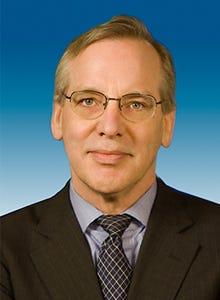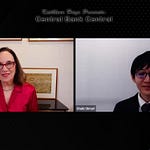Bill Dudley started his career on Wall Street as chief economist at Goldman Sachs, went on to become the third highest Federal Reserve official as president of the Federal Reserve Bank of New York, and continues to actively participate in central banking and financial markets as Chair of the Bretton Woods Committee, a member of the Group of Thirty and more.
And even with all of these years of experience, Bill has been surprised by the Trump tariff regime that the U.S. has entered into now. He sees consumer, business, and Fed uncertainty over how hard this will hit the economy, at a level not seen for a long time - if ever.
Bill is on board with the FOMC’s view that growth now may be slower than before Trump started enacting tariffs and the only way for prices and therefore inflation to go now is up. But even with that he sees the Fed more likely to move to hold rates steady now, unless the labor market starts slowing down. Then, if unemployment tops 4.3%, Powell and company could cut rates, executing the first of two 2025 rate cuts the March dots still predict.
But he’s not counting on that because deportations and closed borders are likely to keep labor scarce, and businesses reluctant to lay off workers.
Dive in and hear what Bill has to say. Why the Fed is now watching inflation expectations so closely. Why the Fed risks would likely lose credibility if it lets inflation not only fail to get back to its 2% target but move higher. Why he thinks Trump Tariffs II are going to have much greater impact on the U.S. than Trump Tariffs I and how hard this could be on policy makers.
Powell is without choice 00:01:06.350
I don't think Chair Powell has a choice of policies. The outlook is very uncertain
Tariffs look bigger, broader, and bad 00:01:11.120
How what's going to happen in the tariff regime is still very unclear in terms of how high, how long, how far, I think it looks like the tariff increases, are going to be broader and more significant than what people had anticipated, and that obviously, is going to be bad for growth and bad for inflation, bad for growth, because it's going to crimp real incomes of lower income households bad for growth because it's going to create uncertainty that's going to deter investment.
SEPS Vs Press Conference: a disconnect 00:01:56.200
Comparison between the summary of economic projections which I think was actually pretty bearish from a market perspective and the response to Powell's press Conference, which is actually people took as very positive: And so the question is, how do you reconcile the two? I think the forecast was actually pretty negative in the sense that the outlook has deteriorated on both the growth and inflation side. Uncertainty has increased for both inflation and employment, and the risks to inflation are to the upside, and the risk to the unemployment rate is to the upside as well. So, deterioration, labor market deterioration, inflation. Not a good thing.
The Dots are more bearish 00:02:35.417
Also, in the summer of economic projections, while the number of rate cuts Median rate cuts stayed the same at 2 the respondents tended to shift up, so the the weight of the distribution was less.
The Return of team transitory- 00:03:04.910
You know, they're very happy with where the economy is and ‘we’ can wait here for a long time to get more information, and probably are more inclined to think that the tariff pressure - price pressures - are transitory rather than persistent. So he said a lot of things that were positive.
Powell massages inflation expectations 00:04:09.590
Powell definitely looked at all the inflation expectations indicators and basically said, most of them are really well behaved, especially, you know. For example, treasury inflation, protected securities. Breakeven rates are not having increased. The New York Fed consumer expectation survey no problem there. The only thing that's really the outlier is the 5 to 10 year forward University of Michigan, which has gone up quite sharply. But he basically said, look at looking at all the indicators. Yes, there's been increase in some of the short-term inflation indicators. But the only long-term inflation indicator that's gone up is University of Michigan. And he basically said, look, we got to look at all of these things, and so he didn't put much weight on the University of Michigan
Trump II tariffs different from Trump I 00:05:04.420
This is different than the 1st Trump term in two very important respects: Number one, The magnitude of the tariff increase is going to be many, many times larger than what happened during the 1st trump term during the 1st trump term. Tariffs went from 1.5% of imports to 3% of imports. Now, it looks like we're going to at least 10% of imports, maybe 15 to 20% of imports. The order of magnitude is much bigger. So, the price effects are going to be much larger. The second thing, that's different is, as you pointed out, this is happening in a period where inflation has been running above the Fed's 2% objective for some time.
Fed credibility may be tested… 00:05:37.740
I do think the risk of inflation expectations becoming unanchored are higher now, not just because the magnitude of the tariff increases is higher, because of recent history. So, how long can the Fed claim that we're going to be credible on inflation, if inflation, year-after-year, stays above its 2% objective?
Why ‘blow up’ the trade bloc? 00:06:27.000
First of all, I think they're <tariffs are> not really in the US interest… to the extent that they're being used so aggressively. The question I always ask myself is, what did Canada do to deserve this? I think the excuses the Fentanyl coming over the Canadian border into the US. But it turns out 0.2% of all fentanyl seizures into the US are at the Canadian border. So that was just an excuse. You know, President Trump is blowing up an integrated economic area. Canada, US, and Mexico, that's become increasingly, economically integrated over the last few years. And that's going to be costly, you know, obviously very costly to Canada and Mexico, but also costly to the US.
A jump in unemployment is unlikely 00:09:30.930
The economy, even if the economy is weaker, is not going to lead to that big of a rise in the unemployment rate for any given degree of weakness, because the labor force growth has slowed dramatically. This year immigration coming over the southern border has collapsed. The number of seizures has gone from Peak during the Biden administration of 100,000 apprehensions a month, down below 10,000… and we have deportation. The labor supply, which was growing very, very rapidly in 2023 and 2024, is going to grow much, much slower this year.
Focus: on the US labor market 00:10:02.620
Even if we grow one and a half percent, we could actually keep the unemployment rate right where it is. My own personal view is, you know, the thing to focus on is the US labor market.
Powell separates ‘soft data’/’hard data’ 00:10:40.
The other thing that was interesting about Powell’s remarks yesterday, he really differentiated between the soft data. You know, sort of consumer confidence and things like that, and the hard data, and really pointed out that the hard data is still holding up, quite well. And I think that's true. If you look at the things like the Institute of supply management indices. They're fine. If you look at employment claims they're fine. If you look at, you know, a pretty broad range of real side economic indicators doesn't look like the economy is falling off the cliff. People are a lot less confident about the outlook because they're scared about the tariffs.
Stagflationary growth 00:12:25.980
The top speed for the Us. Economy is about one and a half percent of Gdp. You know half of what Scott Bessett has called for in his 3 3 program. So I think growth is going to be disappointing. I also think it's going to feel sort of stagflationary, I mean, you know. So you have weak growth in higher inflation. So I don't feel like that's a really great, you know. Feel in terms of how voters are going to experience it. So we'll see how it plays out. But I would say at this point.
Fed flying blind may act too late 00:14:04.560
In terms of the economic outlook, in terms of the range of uncertainty, this is not good. The Fed, unable to figure out what to do… Not good, because there's a risk that the Federal Reserve will ultimately be late in responding to what actually transpires. I don't blame the Fed. I think the Fed is flying blind right now. It's not their fault, but what it means is that if the economy does break one way or the other - either weaker growth or higher inflation - the Fed's going to be late to respond to it
Odd removal of balance of risks statement 00:14:59.250
I don't know why they took it out, but I think maybe they took it out, because yes, while they still think the risks are balanced, they're a lot less certain about that, just because of the cloudiness of the outlook. And so they just felt like making a strong assertion that the risks are balanced seemed to be contradictory to the idea that we don't really know what's going to happen. I think he answered the question. The press conference well, which was taking out that sentence, doesn't mean that we think the risks are now tilted one way or the other, and if you look at the summary of economic projections in the back, there's a whole bunch of charts that look at uncertainty and risk and those seem to show that the risks on inflation to the upside and the risk on growth to the downside are sort of similar orders of magnitude. I think it's fair to say that the risks are still pretty balanced. It's just that there's a lot more uncertainty
Powell to keep a low profile 00:16:24.540
The President can express his opinion about pretty much anything, and in fact, he does. Opining on what the Fed should do, I think, is almost to be expected. The important thing is, how does the Federal Reserve respond to that? And I think Chair Powell is very clear that we're going to stick to our knitting.
Why the labor market is a key 00:20:54.620
The reason why you worry about the labor market is because if the labor market deteriorates beyond a certain point, it tends to be self reinforcing.
© Federal Reserve Bank of New York
William C. Dudley
William C. Dudley became the tenth president and chief executive officer of the Federal Reserve Bank of New York on January 27, 2009. He also served as the vice chairman and was a permanent member of the Federal Open Market Committee (FOMC).
Dudley was born in Springfield, Massachusetts. Although he spent his freshman year of college at Columbia University in New York City he received his bachelor's degree from New College of Florida in 1974. He received his doctorate in economics from the University of California, Berkeley in 1982.
Prior to joining the New York Fed, Dudley was a partner and managing director at Goldman, Sachs & Company and was the firm's chief US economist for a decade. Before he joined Goldman Sachs in 1986, he was a vice president at the former Morgan Guaranty Trust Company. Prior to that, he was an economist at the Board of Governors of the Federal Reserve System in Washington, DC, from 1981 to 1983, so he was not a stranger to the Federal Reserve System when he joined the New York Fed in 2007.
Dudley served as executive vice president of the Markets Group, where he also managed the System Open Market Account for the FOMC. As a leader of both the Markets Group and of the Reserve Bank at large, he has seen the New York Fed weather through the most devastating economic storm since the Great Depression. On identifying himself as a "New York Fed person," Mr. Dudley said that "people are here [at the New York Fed] because they want to work on policy and want to make a difference…contributing something very positive to society."1
In 2012, Dudley was appointed chairman of the Committee on the Global Financial System at the Bank for International Settlements (BIS). Previously, he served as chairman of the Committee on Payment and Settlement Systems at the BIS from 2009 to 2012.














Share this post